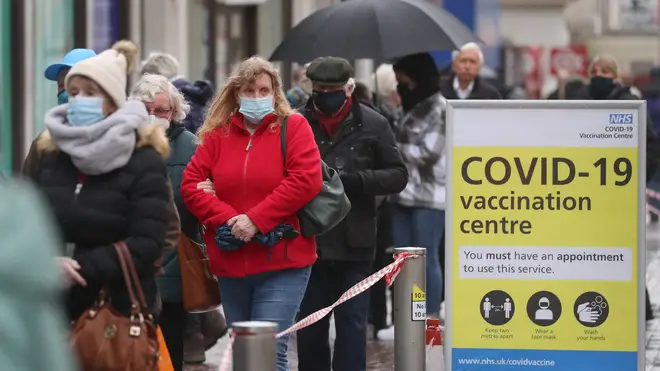
Clive Bull 1am - 4am
16 February 2021, 08:30 | Updated: 16 February 2021, 09:54

The UK's Covid vaccination programme is already reducing hospital admissions, deaths and infection rates, encouraging early data shows.
Boris Johnson has hailed the findings as "grounds for confidence" after scientists said it shows that the vaccine is beginning to slow the rate of infection.
Speaking at a Downing Street press conference on Monday, Mr Johnson said he is "hopeful" coronavirus restrictions can be cautiously eased in the coming weeks.
The Prime Minister said the vaccination programme continued to "power past" the targets set for it but warned it was not the time to ease up on efforts to tackle the virus.
He also said there were "grounds for confidence" that vaccines were helping to curb the spread of coronavirus, not just in protecting those who received the jab.

Boris Johnson: We want this lockdown to be the last
According to a report in The Times, ministers have received early data that revealed vaccinations are cutting infection by around two thirds.
The report said that preliminary figures comparing elderly people who have been vaccinated compared with those who haven't are starting to show that it is cutting serous infection, hospital admissions and death rates.
A second study showed that health workers who have been vaccinated are beginning to show lower rates of asymptomatic infection - a sign that jabs are reducing transmission.
And at the Downing Street press conference on Monday, Sir Simon Stevens, head of NHS England, directly raised the prospect of vaccination rates doubling in the coming weeks.
He said: “In this next phase, this second sprint, actually we’re going to be vaccinating a larger number of people than in the first sprint.
“Overall, although supply will vary week-to-week and we’ll have to adjust accordingly, we may be giving up to twice as many vaccinations overall, given we’ve got to be doing the second doses as well, than we’ve done in the first sprint.”

Brigadier "absolutely" confident April's 32m jab target will be hit
Despite vaccination success, the number of Covid patients in hospital is still higher than in the first peak in April, however this number has been steadily decreasing since the New Year.
Latest government figures show 9,765 new cases of Covid-19 in the past 24 hours, the lowest in four months, while the death toll dropped to 230.
On this, Boris Johnson said: "Although the vaccination programme is going well, we still don't have enough data about the exact effectiveness of the vaccinations in reducing the spread of infection.
"We have some interesting straws in the wind, we have some grounds for confidence but the vaccinations have only been running for a matter of weeks.
"While we are learning the whole time, we don't, as I talk to you today, have all the hard facts that we need.
"And the level of infection remains very high."

Zahawi 'confident' PM's 1m daily Covid jabs target is doable
It comes as exclusive LBC analysis suggests that the government is on course to offer a first vaccine dose to everyone in the nine priority groups by March 30.
If the current vaccination rate continues in the coming weeks, the target of offering a first dose to everyone in priority groups one to nine will be met more than a month before the end of April date that minsters have set.
LBC analysed the current rate of vaccination and factored in the number of second doses that will need to be given from mid-February onwards, based on the number of first doses given during the early weeks of the vaccination programme in December and January.
We found that, at the current rate, March 30 will be the date on which more than 31.8 million first doses have been administered – equating to the number of people in the nine priority groups that the Joint Committee on Vaccination and Immunisation (JCVI) drew up for the first phase of the UK vaccination programme.
Our analysis is based on vaccine supply staying constant in the coming weeks.
However, in reality ministers have suggested that supply is likely to increase in March, meaning the real date could be even earlier than 30th March.
If supply increased at a rate of even ten per cent a week, the 31.8 million figure would be exceeded as early as 18th March – just over a month away.
But even if supply remains at current levels, crucially everyone in Groups 1-9 should still be offered a dose before the NHS needs to start administering significant number of seconds doses – a process which will inevitably slow down the vaccination programme.